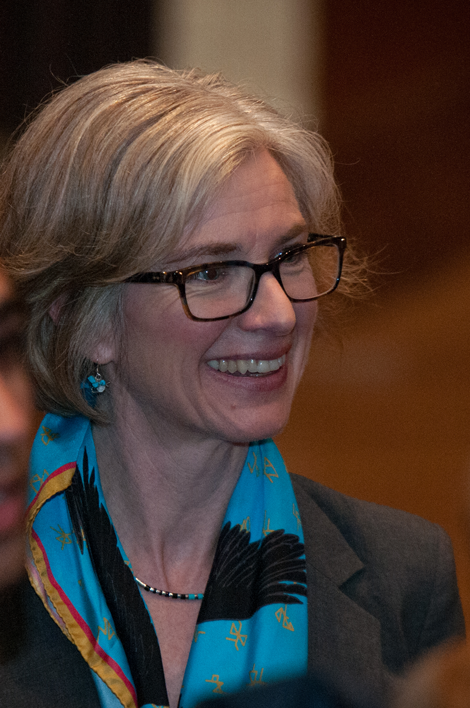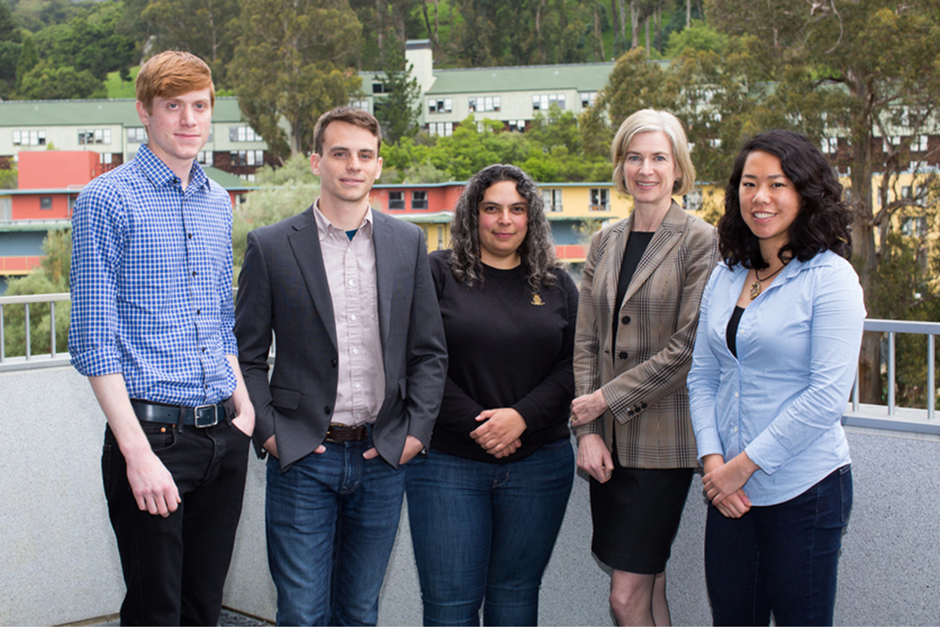
Jennifer Doudna rewrites DNA and the future of medicine
By Rachel Henderson
Jennifer Doudna’s sheer curiosity about an unusual stretch of bacterial DNA led to an unexpected breakthrough that is transforming medicine — the CRISPR-Cas9 gene-editing system. Doudna is a professor of MCB and chemistry at UC Berkeley and was instrumental in the discovery and development of CRISPR as a tool to precisely remove and edit genes. This powerful technology may lead to new treatments, or even cures, for many diseases in the near future.
 Doudna in Kaimu, Hawaii 1976. |
Doudna’s passion for science began when she was growing up in Hawaii, where she became fascinated with the natural world. That same inquisitiveness fueled her career as a scientist, as she investigated the structure and biochemistry of RNA — molecules that help translate DNA code into proteins. She particularly sought to understand the lesser-known functions of RNA, such as how it can catalyze reactions.
Her curiosity about biochemistry led Doudna to become intrigued with mysterious regions of repetitive DNA sequences, called CRISPR, found in some bacterial genomes. Her team helped discover that these regions contain snippets of DNA stolen from invading viruses. The bacteria produce RNA from the CRISPR sequence, which then guides an enzyme called Cas9 to the same sequence within the viruses themselves. Cas9 cuts the viral DNA, protecting the bacteria from infection. Doudna and her colleagues quickly realized that the CRISPR-Cas9 system could be harnessed to selectively target, cut, and edit any gene, with profound implications for medicine, agriculture, and other biology-related fields. For example, a mutated gene that causes disease could potentially be deleted and replaced with a healthy gene.
 Doudna talks to guests after a public speaking event on the future of gene editing. Photo credit: Keegan Houser |
“It is vital that we continue to fund and support basic science,” Doudna says, reflecting on the discovery. “CRISPR technology was the outcome of a fundamental research project and now underpins the development of a new generation of advanced therapeutics that can improve the health and wellness of millions.”
CRISPR-based therapies are already being tested in patients with sickle cell disease, eye disease, and cancer. Doudna says we are “on the cusp of curing” sickle cell disease with CRISPR treatments — which would be an astonishing breakthrough that would greatly improve and extend the lives of patients. She is excited by how the scientific community (including the Innovative Genomics Institute, where she is the executive director) is using CRISPR to target different genes involved in sickle cell disease. “This multi-pronged approach is what the landscape of CRISPR therapies will look like in the future,” she says.
Doudna says she enjoys “guiding young scientists in the lab and encouraging them to move promising research into a company setting to help solve real-world problems.” To accelerate the development of CRISPR-based therapies and other applications, she co-founded Caribou Biosciences with MCB PhD alumna Rachel Haurwitz and Mammoth Biosciences with MCB PhD alumni Janice Chen and Lucas Harrington.
Doudna is well aware of the ethical questions that gene-editing technology raises, and has been outspoken about the importance of considering the ethical implications of CRISPR applications. She is committed to developing CRISPR therapies in a responsible and equitable manner. “We must ensure that CRISPR-based therapies are safe, effective, fairly priced, and widely accessible,” Doudna says.
In her lab at Berkeley, Doudna continues to study and “push the limit” of CRISPR-Cas9, as well as studying anti-CRISPRs that turn the system off once gene editing is complete. She is thrilled about the rapid advances in CRISPR technology that are occurring worldwide. “Within the next 10 years, CRISPR-based therapies can become the new standard of care for treating disease,” she says.
| Since the writing of this article, Doudna has led the Innovative Genomics Institute in switching their work to COVID-19 research and testing. For updates, visit: https://innovativegenomics.org/covid-19/ |  Doudna with original founding members of Mammoth Bio including MCB alumni Janice Chen (right) & Lucas Harrington (left). Photo credit: Mammoth Biosciences |
Back to Main Spring 2020 Newsletter Page
| Connect With Us! | ||||
MCB Twitter |
 MCB Facebook |

LinkedIn |
 Cal Alumni Network |
 Give to MCB |
